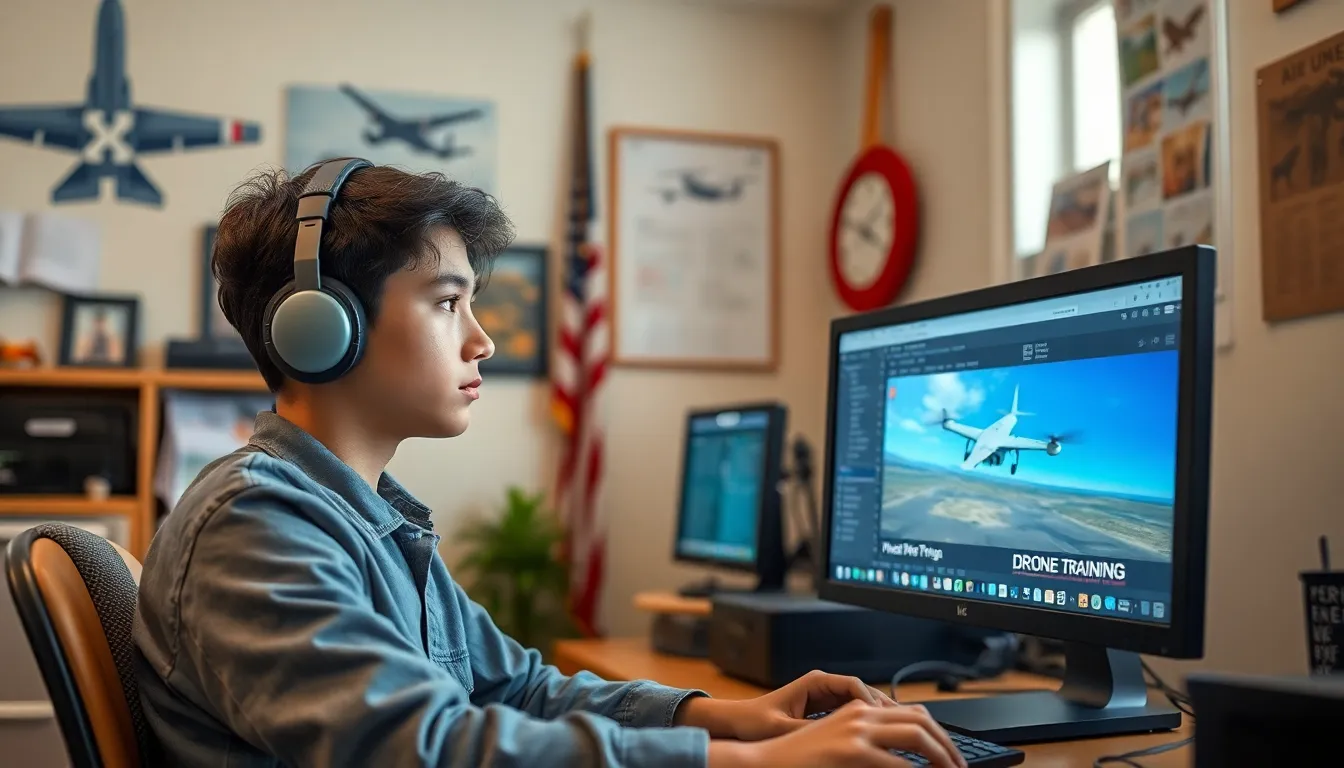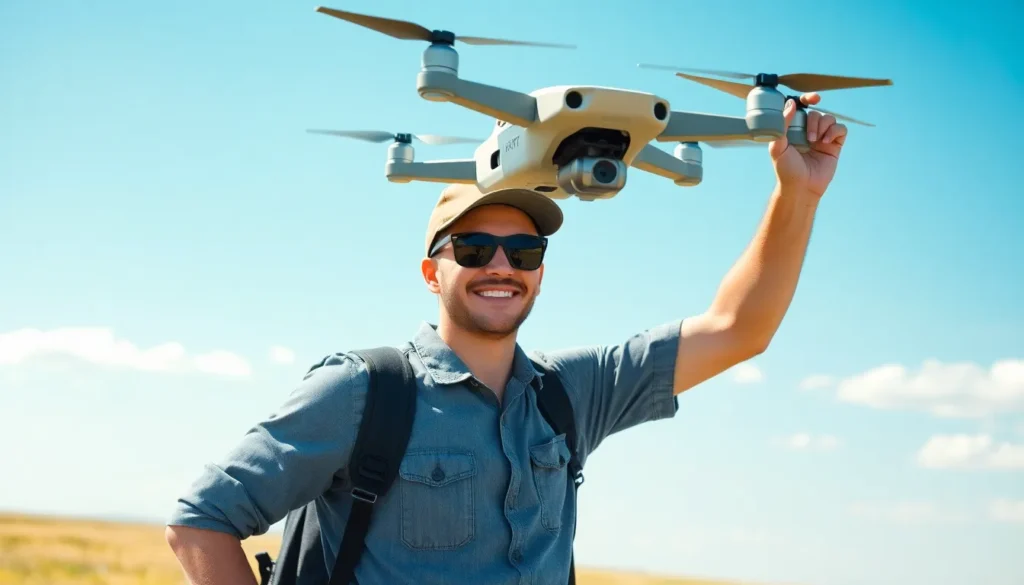Table of Contents
ToggleIn a world where drones buzz like bees and capture stunning aerial views, becoming a licensed drone pilot isn’t just a hobby; it’s a ticket to adventure. Imagine soaring through the skies, snapping breathtaking photos, or even delivering tacos to your friends (because who wouldn’t want that?). But before you take flight, there’s a little something called a drone pilot license that you’ll need to navigate.
Overview Of Drone Pilot License
A drone pilot license, also known as a remote pilot certificate, is essential for individuals wishing to operate drones legally in commercial settings. The Federal Aviation Administration (FAA) governs these licenses in the United States. Completion of the FAA’s Part 107 exam is necessary, which tests knowledge on regulations, airspace classification, weather, and emergency procedures.
Training programs are available that prepare candidates for this exam. These programs cover various topics, ensuring a thorough understanding of drone operations and safety protocols. A minimum age of 16 is required to take the exam, in addition to being able to read, write, speak, and understand English.
The license remains valid for two years, requiring a recurrent knowledge test to maintain certification. Successful applicants must also undergo a TSA security background check. Once certified, drone pilots can engage in activities ranging from aerial photography to agricultural monitoring in sectors such as real estate or construction.
Obtaining a drone pilot license opens up numerous opportunities for professional development. Each licensed pilot contributes to a growing industry, enhancing safety and compliance standards. Therefore, embracing the responsibility and knowledge associated with this certification proves crucial for anyone looking to expand their aerial capabilities.
Requirements For Obtaining A Drone Pilot License

Obtaining a drone pilot license involves meeting specific criteria set by the Federal Aviation Administration (FAA). Understanding these requirements ensures compliance and readiness for a career in drone operations.
Age and Citizenship
Candidates must be at least 16 years old to apply for a drone pilot license. Citizenship is another vital factor; applicants must be U.S. citizens or legal residents. Meeting these age and citizenship requirements establishes eligibility for the licensing process and underscores the importance of responsible piloting.
Training Programs
Completing a training program significantly enhances exam preparation. Various options exist, including online courses and in-person classes. These programs cover essential topics like airspace regulations, weather conditions, and operational procedures, equipping aspiring pilots with necessary knowledge. Engaging in a structured training program increases the likelihood of passing the Part 107 exam on the first attempt.
Examinations and Certifications
Passing the FAA’s Part 107 exam is a critical step towards obtaining a drone pilot license. This examination tests knowledge of regulations, airspace classification, and emergency protocols. Candidates must achieve a score of at least 70% to pass. Upon successful completion, pilots receive their remote pilot certificate, valid for two years. Ensuring they complete a recurrent knowledge test and a TSA security background check is vital for maintaining their certification.
Types Of Drone Pilot Licenses
Understanding the types of drone pilot licenses is essential for anyone interested in flying drones legally and safely. Each license serves a specific purpose and comes with distinct requirements.
Part 107 License
A Part 107 License, officially known as a remote pilot certificate, is crucial for commercial drone operations. To obtain this license, a candidate must pass the FAA’s Part 107 exam, which assesses knowledge of regulations, airspace, weather, and emergency procedures. Individuals 16 years or older, fluent in English, and U.S. citizens or legal residents qualify to take the exam. A passing score of 70% or higher is required to achieve certification. This license remains valid for two years, after which pilots must complete a recurrent knowledge test and a TSA security background check to maintain their status.
Recreational vs. Commercial Licenses
Recreational and commercial licenses serve different pilots. A recreational license allows individuals to fly drones strictly for enjoyment, below 400 feet, and away from populated areas. Registration with the FAA remains necessary for drones over 0.55 pounds. In contrast, the commercial license enables professionals to utilize drones for work purposes, covering aerial photography, real estate, and agriculture. While recreational pilots avoid the rigorous testing required for a Part 107 License, commercial pilots must comply with the same stringent regulations and testing to operate legally.
Benefits Of Having A Drone Pilot License
Possessing a drone pilot license offers numerous advantages for aspiring drone operators. This certification ensures compliance with FAA regulations, providing peace of mind while flying drones in various settings.
Legal Compliance
Legal compliance is a significant benefit of obtaining a drone pilot license. Pilots can operate drones commercially, adhering to regulations set by the FAA. Possessing this certification reduces the risk of legal penalties. Regulations dictate safe flying practices, ensuring pilots understand airspace classifications and weather conditions. Informed pilots follow emergency procedures correctly, minimizing accidents. Registration with the FAA becomes mandatory for drones over 0.55 pounds. Professionals demonstrate accountability through their licensing, enhancing their credibility in the industry.
Career Opportunities
A drone pilot license opens doors to diverse career opportunities. Various industries increasingly rely on drone technology for tasks like aerial photography, surveying, and inspections. Licensed pilots attract potential employers seeking certified operators. Real estate agents, construction companies, and agricultural businesses often hire drone pilots for their expertise. The escalating demand for qualified professionals highlights this growing field. Certified pilots find a competitive edge in the job market, expanding their options across sectors. Numerous organizations offer roles specifically requiring FAA certification, further emphasizing this advantage.
Challenges In Becoming A Licensed Drone Pilot
Aspiring drone pilots face several challenges on their journey to obtaining a license. These obstacles can range from financial considerations to ongoing learning requirements.
Cost and Accessibility
Securing a drone pilot license incurs various expenses. Training programs, exam fees, and equipment costs add up quickly, potentially deterring candidates. Many online courses charge between $150 and $300, while in-person classes may fare higher. Additionally, exam fees typically sit at $175. Potential pilots must also factor in the cost of purchasing a drone or renting one for training. Accessibility remains an issue, particularly for those in remote areas with limited training facilities. Without local resources, individuals often rely on online options, which may not offer the same hands-on experience.
Ongoing Education
Ongoing education plays a critical role in maintaining a drone pilot’s license. Regulations evolve constantly, placing the responsibility on pilots to stay updated. The FAA mandates pilots complete recurrent knowledge tests every two years to keep their certification valid. Many professionals opt for refresher courses to reinforce their knowledge and adapt to changes in the field. Engaging with industry developments through webinars or workshops further enhances understanding of best practices. Staying informed fosters safety and compliance, addressing the challenges faced in this rapidly growing sector.
Obtaining a drone pilot license is a significant step for anyone looking to explore the vast opportunities in the drone industry. This certification not only ensures legal compliance but also enhances credibility and opens doors to diverse career paths. While the journey may involve financial and educational challenges, the rewards of becoming a licensed pilot far outweigh the obstacles. As the demand for skilled drone operators continues to grow, investing in a drone pilot license becomes a valuable asset for aspiring professionals. Staying informed and engaged with ongoing education will further solidify their position in this dynamic field.







